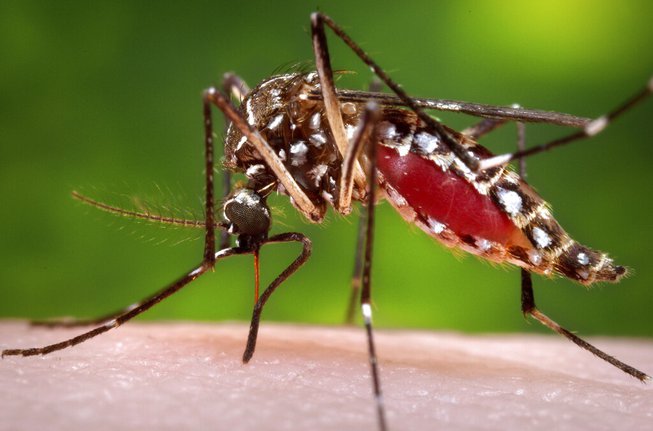
James Gathany/Centers for Disease Control and Prevention via AP
This 2006 file photo provided by the Centers for Disease Control and Prevention shows a female Aedes aegypti mosquito in the process of acquiring a blood meal from a human host.
Thursday, May 4, 2023 | 2 a.m.
Health issues in Southern Nevada
A wetter winter means the possibility of more mosquitoes for the summer. And more mosquitoes mean the possible spread of mosquito-borne illnesses.
The Southern Nevada Health District, which sets thousands of mosquito traps across the Las Vegas Valley, doesn’t typically see a surge in West Nile virus or other mosquito-borne illnesses, said Vivek Raman, environmental health supervisor for the health district.
But that could change this summer. Experts predict that the cooler and wetter winter — which left more stagnant water across Southern Nevada — could create the perfect conditions for more mosquitoes.
“Only consistent thing with West Nile is that it’s very inconsistent,” Raman said. “The risk is always there because we have the mosquitoes that can transmit West Nile.”
Louisa Messenger, an assistant professor in UNLV’s department of environmental and occupational health, has studied control of vector-borne diseases for more than 14 years. She said “it’s quite possible” Southern Nevada could see more mosquitoes this summer, which would increase the risk for West Nile virus cases.
The last time Clark County experienced a severe mosquito season was in 2019 when 43 human cases of West Nile virus resulting in one death were recorded after a stormy spring, Raman said. The health district declared a West Nile virus outbreak at that time, and Raman’s seeing a similar pattern this year.
With an unexpected amount of rainfall leaving puddles of water in parks, pools and people’s backyards, mosquitoes will have plenty of areas in which to breed, Messenger said. The warmer it gets, the more mosquitoes will begin to wake up from their “hibernation” and find these humid places to begin laying their eggs.
“Essentially, where there’s water, there will be mosquito breeding if that water hasn’t been treated,” Messenger said. “Little environmental factors – like the cleanliness of the water, the pH, the salinity, those on a micro level or microgeographical level — will impact the amount of mosquito breeding.”
In 2020, there was only one case of West Nile virus recorded in Clark County, and none have been reported since 2021, Raman said.
West Nile virus is the main driver of mosquito-borne diseases in the continental United States, according to the Centers for Disease Control and Prevention. While 8 of 10 people infected with West Nile virus show no symptoms, some can develop a fever, headache, body aches, joint pains, vomiting, diarrhea or rash. Most people recover completely, according to the CDC.
About 1 in 150 people experience a serious illness that can affect the brain or surrounding areas and cause disorientation, coma, vision loss or paralysis. People over the age of 60, those with chronic illnesses or those who have recently received organ transplants are at greater risk of a severe illness.
West Nile virus is one of the only illnesses that mosquitoes in Southern Nevada carry, according to Messenger, but they’ve also found two other encephalitis strains that rarely are reported.
In 2017, a new type of mosquito that carries viruses like Zika and Dengue fever was also first identified by the Southern Nevada Health District in a backyard. Since then, Raman said the mosquito breed has spread across the valley, but health officials haven’t seen anyone infected with Zika virus or Dengue fever in Southern Nevada.
Because mosquitoes thrive in warm and humid conditions, the majority of West Nile virus cases in the U.S. occur during “mosquito season,” which begins in the summer and lasts through fall.
This can present issues in Southern Nevada, where many residents and tourists alike flock to the outdoors in the early mornings or late nights when temperatures aren’t as blazing.
Although the water fixtures dotted along the Strip may be chlorinated enough to keep out any mosquitoes looking to lay their eggs, ponds or lakes around Las Vegas could provide the perfect breeding grounds, Messenger said.
Residents living near these areas where stagnant, unchlorinated water sits may be at greater risk of being bitten by mosquitoes, which also could increase their risk of acquiring West Nile virus, she explained.
Raman added that backyards can present the most risk to residents and provide mosquitoes with the best free real estate, though.
Raman and Messenger emphasized that mosquitoes were opportunists when looking for places to lay their eggs, and they’ll use anything with standing water, from swimming pools and stray pails outside to broken sprinklers.
“Backyard mosquito breeding is a real problem,” Raman said. “Mosquitoes are constantly looking for areas of standing water, and they can be big like a swimming pool or small like a kid’s bucket that may have just been left out in the backyard.”
The county has yet to see any cases of West Nile virus this year, but officials are expecting the mosquito population to only increase as summer draws closer.
Putting screens over windows, using insect repellents like citronella and wearing long-sleeved clothing while outside during peak mosquito hours can reduce people’s risk of being bitten, Raman said.
Residents can also pitch in to help with mosquito abatement by removing any stagnant water in their backyards, talking to their code enforcement if they see standing water in pools or reporting mosquito activity to the SNHD’s hotline at 702-759-1633.
“Just because we’re in the desert doesn’t mean that we don’t have mosquitoes, especially if you are in and around the parks where there’s water features, or even in your back garden,” Messenger said. “It’s kind of managing them on two different levels: what you can do in and around your house and your environment at a community level and then what you could do on your personal level.”
